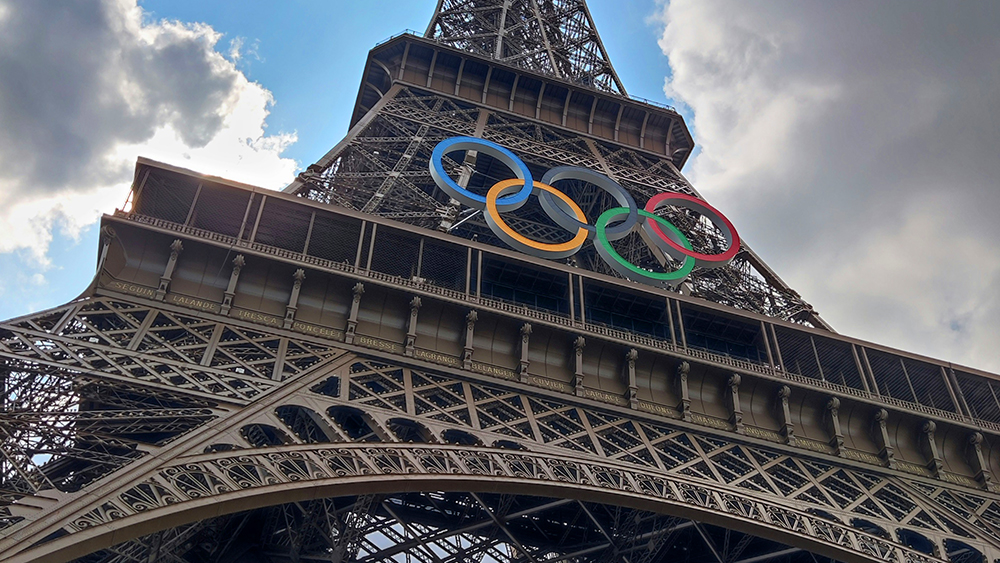
The Paris 2024 Olympic Games are in full swing with a festival of sport underway in the French capital. But the Games aren't only about sport. They're big business, and a huge opportunity for brands. At least for those that get things right.
We've seen no shortage of Paris 2024 design controversies around the Games themselves but also cases of brands hitting the wrong tone in Olympics-oriented marketing, whether they mention the event directly or only allude to it (I'm looking at you Nike and Google). To explore what makes a successful Olympic brand activation, and what brands should avoid, I caught up with Jenna Isken, Group Director, Experience, at the branding agency Siegel+Gale to talk dos and don'ts of Olympics marketing.
The potential of the Olympics Games for brands

There can be no doubt that the Olympics are a golden opportunity for brands. Jenna considers them a potential shortcut to creating the kind of emotional connections that forge powerful bonds with audiences but normally require a lot of investment to cultivate.
"Many organizations find it challenging to develop and implement the deep audience insights and unified approach needed for lasting emotional engagement," Jenna says. "However, the Olympic Games provide a ready-made platform for brands to tap into powerful emotions, albeit temporarily. This global event creates an opportunity for companies to connect with audiences through shared experiences of pride, excitement, and inspiration."
The result is that by tapping into the Olympic spirit, brands can, however fleetingly, establish the kind of emotional resonance that might otherwise take more time and resources to achieve. But how to stand out when everyone's trying to do the same thing?
Standing out in a sea of Olympics marketing
"Brands must consider their authentic approach to Olympic marketing," Jenna tells me. "This year, we're seeing many ads and sponsorships focused on athletes' dedication to their sports. The similarity of these campaigns risks them blending together and losing impact. Most brands would benefit from asking themselves: "What's our true purpose for engaging with the Olympics? Why are we doing this?" This reflection can help create more distinctive and meaningful campaigns."
There are some great examples of Olympic marketing campaigns done well. Jenna highlights Figs' partnership with Team USA. the healthcare clothing company put a twist on the more obvious route of tapping into the viral phenomenon of athlete outfitting by focusing on the often-overlooked support staff. The strategy demonstrated a thoughtful understanding of the Olympic ecosystem beyond the competitors, and the message stood out as a result.
"Figs outfitted medical personnel as if they were athletes, giving these crucial behind-the-scenes workers the respect and recognition they deserve," Jenna notes. "This authentic and genuine approach sets it apart from the crowd of similar athlete-focused campaigns. By spotlighting an essential but frequently unacknowledged group, Figs created a campaign that was not only unique but also resonated with viewers.
Staying authentic
We've also seen of less successful attempts to connect to the Games this year, from that psychotic Nike advert to Google using AI to ruin childhood. And today every misstep faces a lot of scrutiny. There's also the pitfall of trying to claim a connection to the Games by using Olympic branding without permission, something that led the US Olympic and Paralympic Committee to launch a lawsuit against Prime Hydration.
"Any way that you approach partnerships that isn’t authentic is going to be wrong," Jenna warns. "For some brands, that may mean that the best approach to the Games is to not be there. If the audience hasn’t given you permission to be there, you must be careful about what you do with it."
Jenna highlights Red Bull as an example to look to here. The brand has consistently focused on non-traditional sports like X-Games and Formula 1 rather than conventional NCAA athletics. She notes that when it had winter athletes on its roster, it promoted the relationships strongly, but that viewers of the Paris Games will notice an absence of 'Red Bull gives you wings' commercials.
"This absence isn't an oversight – it's a deliberate choice," she says. "Red Bull recognises that forcing a connection with the Summer Olympics doesn't align with its brand identity. Red Bull chose to stay true to its core audience and messaging. This strategy demonstrates the importance of brand consistency and authenticity. Rather than trying to capitalize on every major sporting event, Red Bull focuses on the areas where its brand naturally fits, maintaining credibility and resonance with its target audience."
Olympic marketing has evolved hugely, and it's no longer enough to merely plastering Olympics logos on products. Today, the most successful brands aim to forge meaningful partnerships, actively involving athletes. And technology has also made an impact.
"Real-time ad creation and social media have transformed engagement strategies, allowing for more dynamic and interactive campaigns," Jenna says. "This shift reflects a deeper understanding of consumer expectations and the value of authenticity. Modern Olympic partnerships focus on creating genuine connections rather than just visibility, demonstrating a more sophisticated approach to sports marketing."
For more on the branding of the Olympics themselves, see the best Olympics posters and the Olympic rings history.







